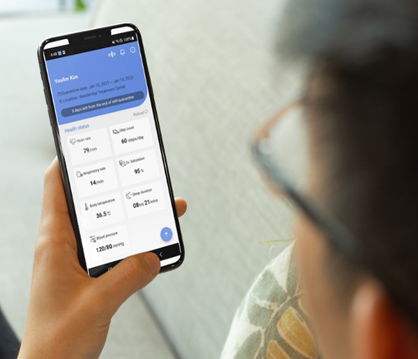Acute symptoms of Corona 19 worsen depression and anxiety
- Analysis of the COVID-19 symptoms and mental health data of 2,600 residents of SNUH Residential Treatment Center
- Sore throat and body temperature increase → Anxiety symptoms ↑... Decreased oxygen saturation → Depression symptoms ↑
It has been confirmed that certain symptoms and signs are associated with deteriorating mental health in COVID-19 patients. The correlation of sore throat and body temperature increase with anxiety symptoms, oxygen saturation with depressive symptoms, and the effect of sleep disorders in exacerbating both conditions were uncovered using Seoul National University Hospital Residential Treatment Center data.
SNUH Office of Hospital Information Professors Chie Eui Kyu & Bae Ye Seul and Biomedical Research Institute Research Professor Sung Sumi's research team analysed the monitoring records of 2,671 patients with mild COVID-19 who were admitted to Seoul National University Hospital Residential Treatment Center from March 2020 to April 2022. The results of examination based on these showed the correlation between acute symptoms of COVID-19 and mental health.
As it was reported internationally that COVID-19 adversely affects not only the physical but also the mental health of patients, various studies have been conducted. However, there has been no study that has analyzed the correlation between early symptoms of COVID-19 infection and mental health.
In order to prevent the deterioration of mental health in patients, it was important to reveal the changes in mental health according to the acute symptoms of COVID-19 so that medical intervention could be predicted.

[A picture] Photo of an app for patients responding to infectious diseases developed by the SNUH Office of Hospital Information
Accordingly, the research team paid attention to large-scale patient data collected at the SNUH Residential Treatment Center. Patients admitted at the time were asked to record their vital signs (body temperature, heart rate, blood pressure, etc.), symptoms (cough, runny nose, sore throat, etc.), and submit mental health questionnaires on a dedicated app developed by SNUH Office of Hospital Information, once both at admission and discharge, and twice a day during quarantine.
Mental health was measured with 6-point scale questionnaires for depression (PHQ-2) and anxiety (GAD-2), and each symptom was considered significant if it scored 3 or higher.
As a result of analyzing the medical records of 2,671 patients collected from four SNUH Residential Treatment Centers, the number of patients with increased anxiety and depression scores during the isolation period was 523 and 535, respectively. About 1 in 5 people experienced an aggravation of anxiety and depressive symptoms during quarantine.
As a result of the analysis by symptom, among the early symptoms of COVID-19, a sore throat and a rise in body temperature were associated with worsening anxiety. A drop in oxygen saturation was found to be associated with worsening depression.
There were also COVID-19 symptoms associated with both anxiety and depression. Complaints of emotional stress and sleep disorders in the early days of isolation were associated with aggravation of both depression and anxiety. In particular, sleep disturbance was a key symptom that could exacerbate both depression and anxiety.
As a result, the research team explained that some of the early symptoms of COVID-19 had a significant association with deteriorating mental health and that if the symptoms were present, it was necessary to consider medical intervention for the patient's mental health.
Biomedical Research Institute Research Professor Sung Sumi said, “This study is the first study to identify the association between acute symptoms and signs of COVID-19 and mental health.” “In particular, it is meaningful as we were able to utilize the big data of the Residential Treatment Center secured through the clinical data warehouse of Seoul National University Hospital,” she said.
Office of Hospital Information Prof Bae Ye Seul said, "Based on this study, in the future, if we collect the symptoms and signs of COVID-19 patients remotely and conduct appropriate interventions according to the patient's condition, we will be able to help care for the patient's mental health."
This study, supported by the Institute of Information and Communications Technology Evaluation and Planning, utilized large-scale data collected from the ‘remote patient monitoring system' built in the early days of COVID-19 by the SNUH Office of Hospital Information, and was published in the international journal 'JMIR Public Health and Surveillance (IF 14.56)'.